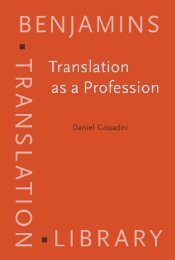Constructing a Sociology of Translation.pdf
Constructing a Sociology of Translation.pdf
Constructing a Sociology of Translation.pdf
- No tags were found...
Create successful ePaper yourself
Turn your PDF publications into a flip-book with our unique Google optimized e-Paper software.
Locating systems and individuals in translation studies 129Mediating between systems and individuals: LocalismThe contingent nature <strong>of</strong> the various agencies and institutions involved in translationpractices can be investigated with the help <strong>of</strong> the notion <strong>of</strong> localism. I havederived the concept <strong>of</strong> localism from the work <strong>of</strong> Tymoczko (1999: 31–32), anddeveloped it in my own book on eighteenth-century women and translation(Agorni 2002), 6 as a complement <strong>of</strong> the systemic approach I employed. Accordingto Tymoczko, “localized” research into specific translation phenomena (providinga careful and detailed reconstruction <strong>of</strong> their social, linguistic, historical, andcultural contexts) allows individual case studies to avoid the danger <strong>of</strong> generalisation.In this perspective case studies are definitely brought to the fore: theirrole is no longer perceived as marginal, but rather acquires a fundamental significancein their role as a testing-ground for the discovery (and implementation) <strong>of</strong>general patterns <strong>of</strong> translation behaviour. The fact that case studies provide thevital setting that makes translation activities “real” may appear obvious, and yettheir primary function is neglected by those approaches which create a rigid dichotomybetween the metaphorical and practical dimensions <strong>of</strong> translation phenomena.7 Rather than reinforcing old divergences in translation studies, it wouldseem more productive to consider translation as a set <strong>of</strong> symbolic and materialistpractices, each side <strong>of</strong> the coin giving substance and weight to the other, and bothunited in the effort <strong>of</strong> performing a fundamental cultural activity.Localism is a concept which focuses on the local, circumscribed aspects <strong>of</strong>cultural phenomena, and aims at mapping the details <strong>of</strong> the historical, social andlinguistic contexts <strong>of</strong> translation activities. This approach works effectively by. The notion <strong>of</strong> localism has been used in my research as a theoretical basis for a minuteand detailed historical analysis <strong>of</strong> the cultural production <strong>of</strong> eighteenth-century British women(Agorni 2002). A distinctive focus on the local allowed translation activities to display theirspecificity (for example by means <strong>of</strong> a close textual analysis, see Chapter 3) and, at the sametime, provided the details for an accurate socio-cultural contextualization (see the long discussionon the social and cultural position <strong>of</strong> eighteenth-century women and the effects <strong>of</strong> this ontranslation in Chapter 1 and 2). On methodological terms, localism is committed to registerevery act <strong>of</strong> translation, irrespective <strong>of</strong> its significance, without forcing it into a coherent, meaningfulpattern. My work attempts to demonstrate that even apparently unimportant translationminutiae, such as the eighteenth-century translation <strong>of</strong> an Italian handbook on Newton’stheory <strong>of</strong> light and colours, may acquire a fundamental role once appropriately contextualizedagainst the broad backdrop <strong>of</strong> intercultural activities in the period concerned.7. Michael Cronin has argued that some poststructuralist approaches do not take into properconsideration the materialist side (i.e. linguistic nature, in his examples) <strong>of</strong> translation phenomena(2000: 103). However, the increasing sophistication <strong>of</strong> poststructuralist criticism is effectivelyworking to reduce such a risk (for a discussion on this topic see Agorni 2002: 90–91).
















